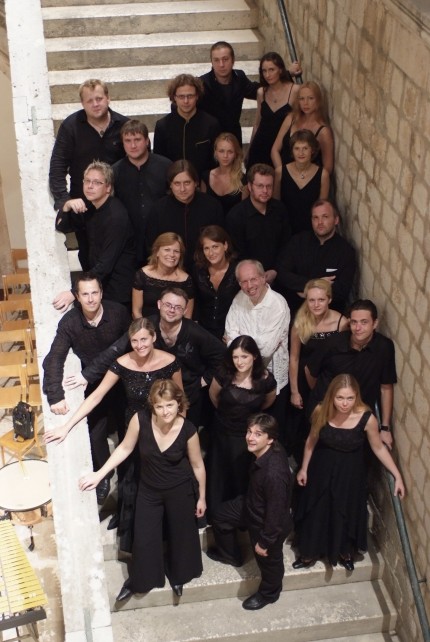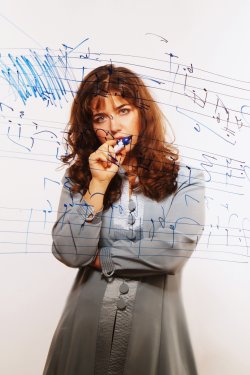Kremer, Baltic musicians serve up compelling, dizzyingly eclectic program

Gidon Kremer and Kremerata Baltica performed Saturday night at the Harris Theater.
On a packed weekend of music in Chicago, Gidon Kremer returned Saturday night to present a typically offbeat and envelope-pushing program with his eponymous string ensemble Kremerara Baltica at the Harris Theater. The program, titled “De Profundis,” is taken from the celebrated Latvian violinist’s new album on Nonesuch with Kremerata Baltica.
Despite much unfamiliar music, the program book provided zero information about the works apart from titles. There was, however, a rambling introductory statement from Kremer castigating the usage of oil by authoritarian regimes (Saudia Arabia, Iran, Myanmar and Russia were cited), and making a plea for democratic reform as well as the hope that this music will offer some spiritual balm for the soul.
An admirable sentiment to be sure, and while Saturday’s wide-roving program had its uneven moments, for the most part, Kremer’s restless musical intellect and the energized playing of the Baltic musicians provided a fine evening of music.
The evening led off with a worthy reading of Bartok’s Divertimento, led by an unnamed female first violinist who handled her bravura solos with great skill. The central Adagio, cast in the vein of Bartok’s unsettling nachtmusiks, was notable for its widely terraced dynamics. The performance was rounded off with a whirlwind performance of the finale that bracingly conveyed the pungent Hungarian folk accents
The Schumann bicentennial year has brought audiences an array of rarely heard repertoire but probably none more bizarre than the violin arrangement of Schumann’s Cello Concerto in A minor performed by Kremer Saturday night.
The violinist clearly must believe in this concoction, and, while the reduction for string ensemble and timpani by Rene Koering is skillfully wrought, I can’t say I was convinced. The music seems to call for a darker, more incisive solo instrument and there is a want of ballast, not just due to the reduced forces but musically, as well. Kremer’s articulation was fluent enough but his intimate playing and light bowing made for a rather low-voltage reading of a decidedly strange work.
The second half of the program provided more consistent rewards, reflecting Kremer’s advocacy for new music and tireless and enterprising search for common ground in music across the centuries.
De Profundis by Raminta Serksnyte led off the second half. While performed with polish and bracing intensity by the string ensemble, the Lithuanian composer’s alternation of furioso sections with wide contrasts doesn’t show sufficient individuality to distinguish it from the torrent of angst-ridden Eastern European music of the last two decades.
More illuminating was Kremer’s performance of paired works by Schubert and Arvo Part. In the Minuet in D minor (from D.89), Kremer was fully in his element, playing with his singular brand of unsentimental sweetness and bringing out the mordant rumination beneath the surface lilt. Part’s retooled version of his Passacaglia for violin, strings and vibraphone inhabits a similar sound world with a 21st-century angularity, and Kremer’s delicate playing brought out the wistful expression with great sensitivity.

Lera Auerbach
Kremer decided to mark the fact that the young composer Lera Auerbach was in the audience by replacing the scheduled work by Stevan Kovacs Tickmayer with Auerbach’s Sogno di Stabat Mater.
This expansive work by the supremely gifted young Russian composer is a revised version of the larger original, created specifically for Kremer’s ensemble. Auerbach here revisits themes from Pergolesi’s famous Stabat mater into a kind of modern concerto grosso for violin, viola and vibraphone. In addition to reflecting the consolatory spiritual dialogue between a grieving mother and child, the work also conveys a dynamic tension between the three solo protagonists and backing ensemble, as well as setting Auerbach’s edgy contemporary esthetic against the formal gravitas of Pergolesi.
This sort of hard-worn consonance from disparate elements is prime meat for Kremer and it’s worth noting that Auerbach’s unscheduled work received not only the finest performance but the most enthusiastic ovation of the evening. Kremer, violist Ula Ulijona, and vibraphonist Andrei Pushkarev drew on a striking array of dynamics and tonal hues, bringing a concentration and laser-like intensity to this somber, compelling music, which was also reflected in the playing of the backing string ensemble.
Piazzolla closed the evening. Kremer’s spare, gentle take on the Melodia in A made the music sound more Baltic than Argentinian, and the ensuing Fuga offered a brilliant duo showpiece for Kremer and vibraphonist Pushkarev.
The prolonged applause brought Kremer back for two encores. First was Piazzolla’s Michelangelo ’70, which provided another opportunity for Kremer to share the stage with Pushkarev’s athletic vibal virtuosity.
For a bizarro finale, the string musicians put down their instruments to tackle Ernst Toch’s infamous Geography Fugue. In Kremer’s arrangement, the spoken multipart interjections took on the flavor of a Baltic folk round, as the instrumentalists robustly shouted out the rapid-fire succession of cities and countries with full-voiced swagger, enthusiastically swaying to the rhythm.